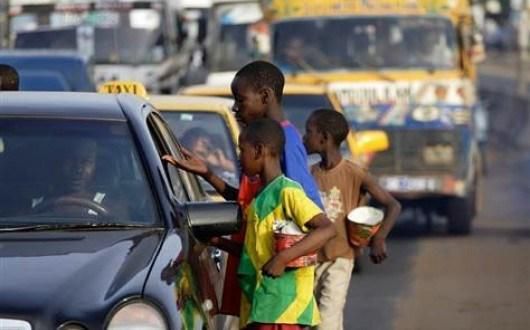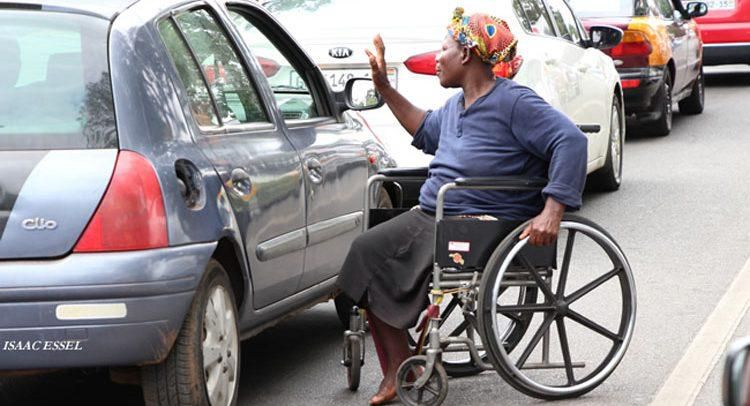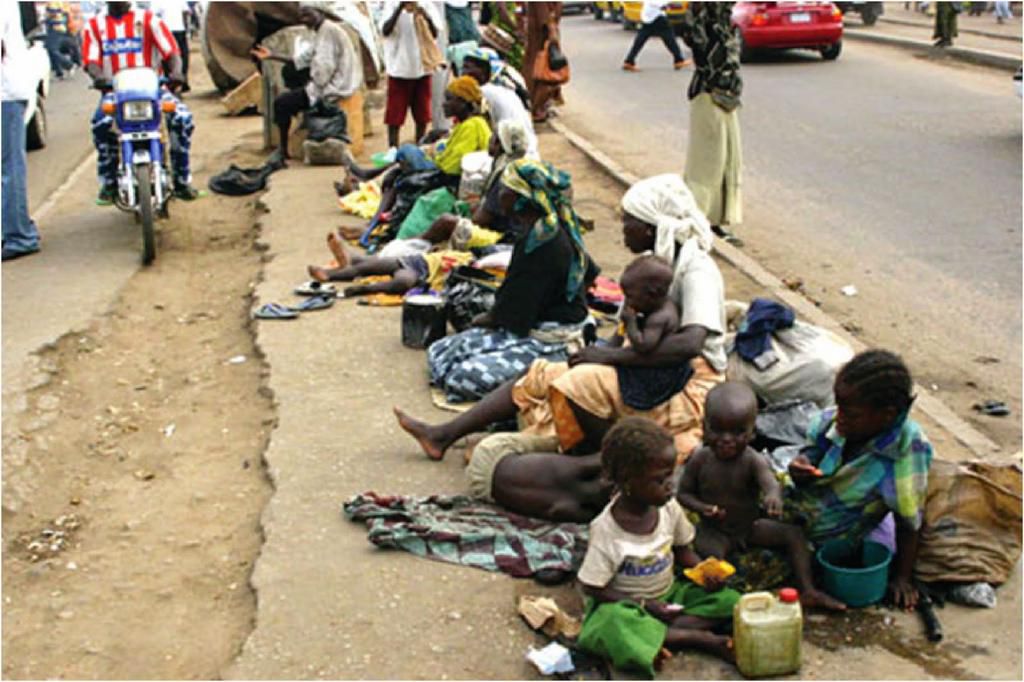Streetism: How the Ghanaian’s ‘generosity’ worsens it
)
Most of us, about a two or three years ago watched the viral video of a man roughly 40, and physically challenged from waist down, beating up a child mercilessly for begging for alms in his ‘territory’ around opeebia junction (along 37 Millitary hospital road). I’ll call him Kwasi B to make referencing easy. First of all, the law hasn’t legalised begging, let alone, designated geographical locations for them to ‘ply their trade,’ so he has no claim to any territory. Secondly the victim was just a boy and was no match for him but Kwasi B didn’t care, he just grabbed an opportunity to bully. When the boy was interviewed, he said he was just hungry and needed money to buy food. Further questioning revealed that, although his parents were alive they didn’t have the means to cater for him.
Clearly the general understanding most people have for a street child is: one who has completely disconnected from family due to truant behaviour or some social vice and survives in the streets; and/or a child that is orphaned without a shelter with no benevolent family left to support him/her. Though both perceptions are valid, that is not the case for all the kids. Just like the boy who was beaten by Kwasi B, he had family but they were in no position to look after him so his means of survival begins by begging for alms. It could take weeks or months before he pays another visit to his parents. During that period, anywhere in the open will do as a resting place.
Some of the kids are just victims of neglect and bizzare parenting; parents who have the mentality that it is normal to live on the streets so their kids follow suit. Other kids take to the streets to escape domestic abuse, and some become hawkers due to poverty. Whatever the reason for their streetism, they still deserve a chance at a better life.
Now back to Kwasi B; even if hypothetically it was Kwasi B’s territory, a humane kind-hearted individual will sympathise with the little boy and share his begging ‘income,’ but he rather chose to beat him up; only a demon would do that. Well in case you’re wondering, the B in his name stands for Bonsam [Devil]. Ever since then, anytime I see Kwasi Bonsam I remember his disgraceful act and never drop a penny in his bowl. And your answer is, NO! he doesn’t deserve a second chance until further notice.

I have also seen some of the younger ones do silly stuff especially the Chadians; insulting people for refusing to give alms etc. One time, a Chadian kid hit a certain woman for not giving money and she (the woman) scolded the girl and left angrily. That’s a typical uncouth brat, and her parents (CEOs of the business) couldn’t even teach her to be nice to the customers. Logically you’d expect people with low living standards to control their birth, but ironically they take the Genesis 9:7 bible verse too seriously. Come to think of it, the more ‘employees’ they procreate, the better.
I was commuting from Madina to Accra Mall (destination) when a Chadian mother and her two kids and a baby boarded the trotro. She accused the ‘mate’ of charging her an unreasonable fare and started cursing him. Apparently, most times they board trotros, they have no money and have to beg and out of pity, the mates don't take money. The mate who was clearly not pleased with the wrongful accusation and somewhat shocked with the ungratefulness, revealed that they come from far distances to beg and make lots of money but still find ways to avoid paying trotro fares. Basically Tetteh Quarshie roundabout is one of their major market places, where they all converge to exhibit sorrow and misery in exchange for money. One thing that also concerns me is their trademark of aggressively holding passers-by for money. They hold thousands of people everyday; God forbid but should one of them have any communicable disease (eg. Ebola,) they will spread it rapidly. I have had a few more personal experiences and heard similar stories from other people of their attitude which I will save for another day, since I don’t want to turn this short article into a book.
Please don't let them make a fool of you. These Chadians see themselves as higher and cannot work under black people, this explains the reason why they never get actual jobs. If they wanted sympathy, with a mentality like that coupled with their horrible attitude; that sympathy is out the window. Of course there surely would be a few that are different who are calm and well mannered. I know of a story where one Chadian girl made the news when a woman she asked money from deliberately said she didn’t have any money, so she (girl) surprisingly offered to give the little she had. The woman was touched and shared the story on social media. That girl is one of the very few reasonable ones but one thing constant is that, they all refuse to work and their laziness shouldn’t be encouraged.

The Chadians are not the only guilty ones, I have seen natives of this country like Kwasi B and many, act similarly. The street girls engage in prostitution, the young boys pick pockets. Drug abuse and occultism are among other things they indulge in. It will take the selflessness of individuals, charitable NGO’s, and competence of responsible authorities to get them off the streets.
The Accra Metropolitan Assembly collaborated with the Department of Social Welfare in May 2018 to eject 200 persons including children believed to be from Niger and Nigeria from some ceremonial routes, streets, under bridges, and in traffic, begging for alms from benevolent individuals (Ansah, 2018).
Some celebrities run charity organisations, the likes of John Dumelo, Van Vicker, Michael Essien, Diana Hamilton and Nana Ama McBrown to mention a few. A lot more of them are giving back to the society by providing stationery, toiletries and donating cash to other orphanages to cater for school fees etc. Fortunately there are many orphanages in Ghana and an encouraging numer of our local radio and television stations donate to them periodically. The sad thing though is that, not many of these orphanages meet requirements.
Grace Omaboe the veteran actress and philanthropist popularly known as Maame Dokonu used to run an orphanage. It was a great initiative from her to think about the needs of street children and orphans; she even had a program on Metro TV back in the day where she interviewed people with serious problems and solicited funds from viewers to support them. She was arguably the Oprah Winfrey of Ghana during her active years; that being said, it wasn’t rosy for her.
In 2009 her Peace and Love orphanage was closed down by the Department of Social Welfare (DSW.) Months later Grace was charged with three counts of operating without a license and exposing a child to harm to which she and two other caregivers of the home pleaded not guilty. The children were underfed and left malnourished, and made to live in darkness and poor ventilation. It was also reported that older children abused the younger ones. Investigations proved that two kids, two years and six months respectively were sodomised by some older children not older than 11 years. She once travelled to Holland leaving behind GHc 50 for upkeep of the entire home (she wasn’t blessed with Oprah’s wealth.) It is a rather bitter ending to what was a great initiative from a good Samaritan.

These homes become the refuge for kids taken from the street and orphans so they have to be well equipped. The often presumptuous good intentions behind the establishments of these insitutions are not enough. Our future leaders need to be well educated, safe and free from abuse, so we need not see the DSW as Hitler terrorising humanity but rather like Jesus sacking the traders from the synagogue; It is a necessity. With poor living conditions some of the kids could be forced to return to the streets; thankfully the DSW are on top of issues, just 9 months ago they shutdown 60 illegal orphanages for falling below standards and operating without licenses. The DSW however are not getting much support, they disclosed this about five weeks ago, and appealed publicly for funds to reduce streetism.
The Ministry of Gender, Children and Social Protection seem to be on top of their game too. In April they reacted promptly to a report by GBC 24, by deploying the police to relocate over 34 children to a foster home at Madina near Accra.
People are no longer donating to children homes and orphanages because of reported stories which has unfortunately corrupted people’s perception about all orphanages. Some workers allegedly bloat exepenses to encourage more donations, divert some cash donations and food items for personal consumption, pimp girls for unscrupulous men to have sex with them etc. We need anyone planning to set up an orphanage to endeavour to be ethical to help change this perception.
Let us look at other ways to help these children. Many of them are talented but just need a chance to exhibit it. Though Abraham Attah wasn’t homeless he was discovered in the streets; he was just playing football one day and was approached by a man whom he (Abraham) thought was a football scout but happened to be a movie director. Long story short: he auditioned for the role of Agu and nailed it; the movie Beast of No Nation won some awards and won Abraham some personal awards too.
Now what is the way forward: Let us create some sort of livelihood for these kids. We can introduce them to some sports disciplines and coach them to become professionals. It doesn’t necessarily have to be the government’s responsibility; any well funded body or wealthy individual can take this initiative. Also reality shows can be very instrumental; it will be wonderful if we could get some with criteria which qualifies only talented street kids. Contestants’ lives can be transformed like the Ugandan dance group ‘Triplets Ghetto Kids’ who have gained global recognition and performed at the BET Awards recently. They were from the ghettos and streets but now have a foundation of their own to help streets kids.
For sports, we could partake in tournaments like the Street World Cup, Homeless World Cup etc. The Homeless World Cup has existed since 2001, but I am sure you have never heard it mentioned in any sports bulletin in Ghana and the Street World Cup, existing since 2010, has never been featured in by Ghana. These are not the only tournaments for street kids, the are few others for different sport disciplines that our media just need to highlight very often, because people can only participate in what they know exists.
We can draw inspiration from sports people who also lived on the streets but made it. MMA fighter Bibiano Fernandes is one; his mother died when he was only seven, which ultimately led to his father abandoning him and his four siblings to live in the Amazon Jungle, hunting and scavenging just to survive. He is now the Bantamweight Champion in Singapore based promotion, ONE Championship. Another name is Balezi Bagunda, a former child soldier, who goes by his boxing name Kibomango. He became Congo’s boxing champion in 2008. Now he and other ex-soldiers teach the sport to street children (Almond, 2017). Even the physically challenged street folks like Kwasi Bonsam can be inspired by Emmanuel Ofosu Yeboah who was born with a severely deformed right leg but persevered and became an award winning cyclist, who is now known globally. Disability is clearly not an Inability.
I entreat the Government to allocate more funds to the ministry to do its work adequately; and I entreat our religious leaders and their congregations to frequently visit these kids not just to donate items but to importantly impart the word of God into them. These teachings will help them stay morally upright. On that religious note, 2 Thessalonians 3:10 says that “If a man will not work, he shall not eat.” Be generous and help anyone in need but not people who evidently make it their job to be in need, just to attract your generosity.
Story by Gerard Amavi
)
)
)
)
)
)

)
)
)
)
)
,fit(112:112))
)
,fit(112:112))
)
)